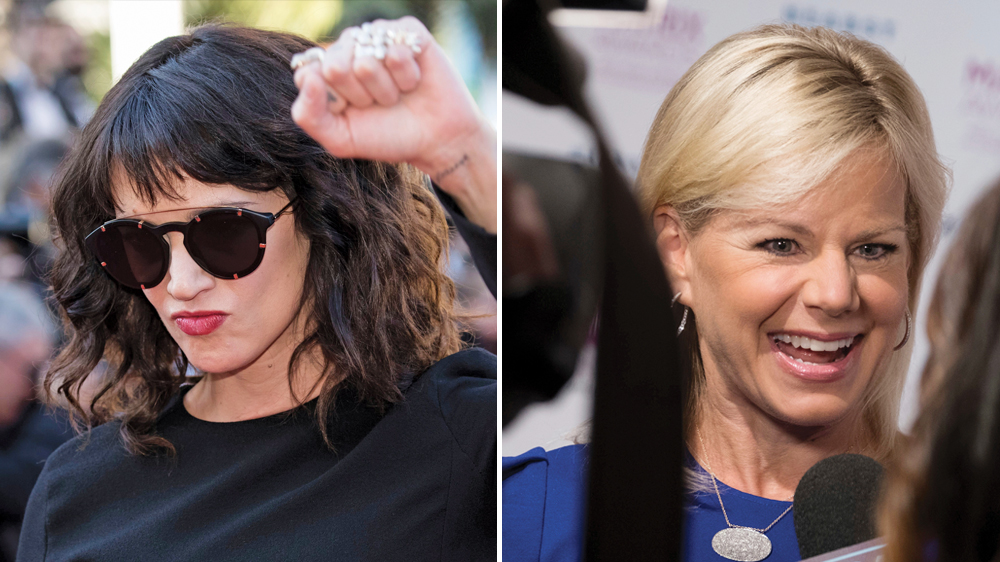Will Charges Against Asia Argento, Gretchen Carlson Stop Survivors From Coming Forward?
By Cynthia Littleton
LOS ANGELES (Variety.com) – Asia Argento and Gretchen Carlson have been among the most prominent voices in the #MeToo movement, which has encouraged women to share stories of sexual harassment and abuse and to name their abusers. Both women have been hailed for their courage in coming forward, and now both women are grappling with the downside of having a heightened public profile.
Argento, the Italian actress-director, was one of a handful of women to go on record last October with Ronan Farrow in The New Yorker about allegations of sexual assault at the hands of the now-disgraced Harvey Weinstein. Carlson, the TV news veteran, helped ignite the cultural wave of female empowerment with her 2016 sexual harassment lawsuit that swiftly brought down Fox News chief Roger Ailes.
Argento became enmeshed in scandal on Aug. 19 when The New York Times reported that she reached a $380,000 settlement earlier this year with actor-musician Jimmy Bennett. Bennett has accused Argento of sexually assaulting him in 2013 when he was 17 and Argento was 37. Argento has denied having sex with Bennett and said the settlement was driven by her late boyfriend, Anthony Bourdain, in the hopes of making the entire issue go away. Fallout from the accusation has seen her fired as a judge on “X Factor Italy.”
Carlson has been accused of bullying and coopting the spotlight in her role as chairman of the Miss America Organization. The reigning Miss America, Cara Mund of North Dakota, has accused Carlson of taking over most of the media appearances associated with Miss America and using the organization as a platform to promote Carlson’s personal business agenda. More than a dozen former Miss Americas and numerous officials associated with state and national MAO pageants have called for her to resign the post she took on in January after the previous regime was ousted amid a scandal.
Carlson has denied bullying or silencing Mund. Last week, NBC’s “Megyn Kelly Today” devoted an 11-minute segment to the story, with former Miss Americas Suzette Charles and Heather Whitestone strongly criticizing Carlson’s handling of the organization and her treatment of Mund.
The controversies enveloping Argento and Carlson are not directly connected to the alleged sexual misconduct that they worked to expose. But there is no question that the public profiles of both women have become more visible as a result of speaking out.
That heightened visibility means greater scrutiny of their personal behavior and vulnerability to public embarrassment if others should decide to call them out over their own behavior. This dynamic is a big factor in discouraging women from reporting abuses in the workplace and elsewhere.
“There’s no question that a deep fear of retaliation is a major reason why people don’t come forward in the first place,” says Fatima Goss Graves, president-CEO of the Washington, D.C.-based National Women’s Law Center. The NWLC is the administrator of the Time’s Up Legal Defense Fund, an effort started by women in the entertainment industry to aid victims of sexual harassment around the country.
“There is no one idea of a victim and there is no one idea of an abuser.”
Fatima Goss Graves, National Women’s Law Center
Without commenting on the veracity of the allegations leveled against Argento or Carlson, Graves noted the importance of recognizing that both abusers and victims are often individuals with complex personal lives and backgrounds.
“Abusers come in a wide range of sizes, shapes and forms. And the same is true for people who have experienced abuse,” Graves says. “One of the most important things that the public has been learning since #MeToo went viral is there is no one idea of a victim and there is no one idea of an abuser. Busting open the stereotype that there is some perfect quality around victims or some terrifying quality around abusers at all times is important.”
The fear of direct retaliation in the workplace is a huge concern, particularly for women whose stories will never make headlines like Carlson and Argento have.
“In litigation or the context of a [legal] complaint, women worry deeply they will be blamed or shamed for their history,” Graves says. “They worry that this will become the focus rather than what they are complaining about in the moment.”
But Graves does not believe the accusations against Argento or Carlson will hurt the credibility of #MeToo or Time’s Up, because these movements are responses to a widespread cultural problem with deep roots. Time’s Up has been contacted by more than 3,700 people seeking help from the defense fund since the initiative went live on Jan. 1, Graves reports.
She also notes the significance of women going public with decades-old stories of abuse that are beyond the reach of legal sanction.
“Some of these people coming forward are sharing their experiences even if their legal rights have now passed,” she says. “They still understand the importance of continuing to push us culturally and to push our institutions to do better.”
RELATED VIDEO:

